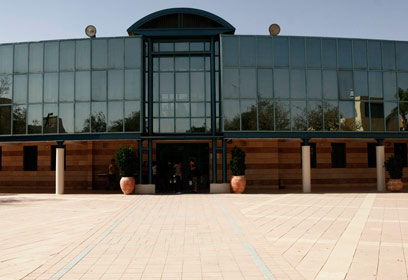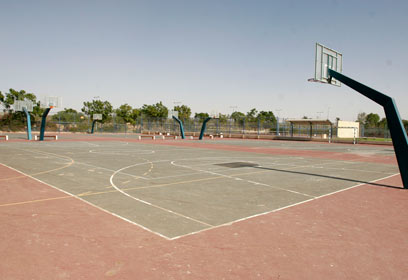
A lesson in inequality
As opposed to comfortable learning conditions in Omer, Bedouin students attending nearby Segev Shalom high school study in overcrowded caravans with no air-condition. Teacher: Our goal is that these students attend university, but it's not easy
The Omer Comprehensive High School boasts beautiful lawns, marble walls, class schedules on plasma screens, soccer fields and a gym, a student radio station, a NIS 14.5 million (about $4 million) annual budget and an 80% matriculation eligibility rate.
The Segev Shalom High School is located just 12 kilometers (about 7.4 miles) away, but there the students study in overcrowded caravans with no air-conditioning. The matriculation eligibility rate at the Bedouin town's school stands at 40%, and the students do not even dream of a gym. This is how the Israeli education system perpetuates inequality.

$4 million yearly budget. School in Omer (Photo: Eliad Levy)
Ziva Drori, the principal at Omer Comprehensive High School, says the 17 Bedouins who attend the school are "just like everyone else."
"Two Bedouin twins who graduated last year now study medicine, and they even joined a school trip to Poland," she says.
Amir Abu Ravia, an 11th-grader from the Bedouin town Kuseife, says his parents decided not to enroll him in the local school "because they thought the school in Omer would be better suited for me.
"I was received warmly here, and I plan on joining the army to contribute to the country," he says.
Amir's father is the first Bedouin physician in Israel, and his mother is a genetic advisor.
About 97% of students who graduate from the school in Omer enlist in the IDF, with many of them joining elite units. However, Principal Drori says the school's "elitist" image is not entirely accurate. "Most of the students come from a high socio-economic background, but others come from a different background, and I am proud of this," she says.

Baskeball court in Omer school (Photo: Eliad Levy)
Muhammad al-Hamamda, the principle at the school in Segev Shalom, attributes the low matriculation eligibility rate to the fact that the institution offers mechanics and electronics courses. Students who take these classes do not apply for a full matriculation certificate. "Without these two courses we stand at a 50% matriculation eligibility rate. For the Arab sector, this is considered very good," he says.
Al-Hamamda says the Education Ministry's Southern District is making great efforts to increase the number of Bedouin students who are eligible for matriculation certificates. "They are giving us more study hours to prepare students for the matriculation exams, and we always ask for more."
Fatma Abu Hamad, a guidance counselor, says the school's most urgent problem is violence. "Some of the confrontations have to do with the fact that the students enrolled here belong to different clans. Some of the students study in caravans and get 'scorched' during the summer.
"There is a shortage of desks and chairs. Some kids have computers, electricity and everything else at home, but those who don't have a hard time completing their homework," she says.
Fatma's husband Mahmad, an English teacher at the Bedouin school, says that despite the overcrowded classrooms (about 38 students in each class), the students are "disciplined" and "respect the teachers."
Luvana Jarjau, a 17-year-old student at Segev Shalom, says education within the Arab sector must improve. "Many students, mostly female ones, sit at home after graduation. Why don’t they continue with their studies? Ben-Gurion University is so close," she says.
The situation at the Al-Nur High School is quite different, as some 72% of the school's graduates are eligible for matriculation certificates. Noel Abu Rabiah, a Meitar resident who teaches at Al-Nur, says she never considered teaching at Omer "because there were rumors that the kids were spoiled. The level is high, but I was looking for values as well.
"Once I saw one of my students working as a gardener in Meitar. I said to myself that if this is where he ended up then we have failed. Our goal is that these students attend university, but it's not easy," she says.
- Follow Ynetnews on Facebook










